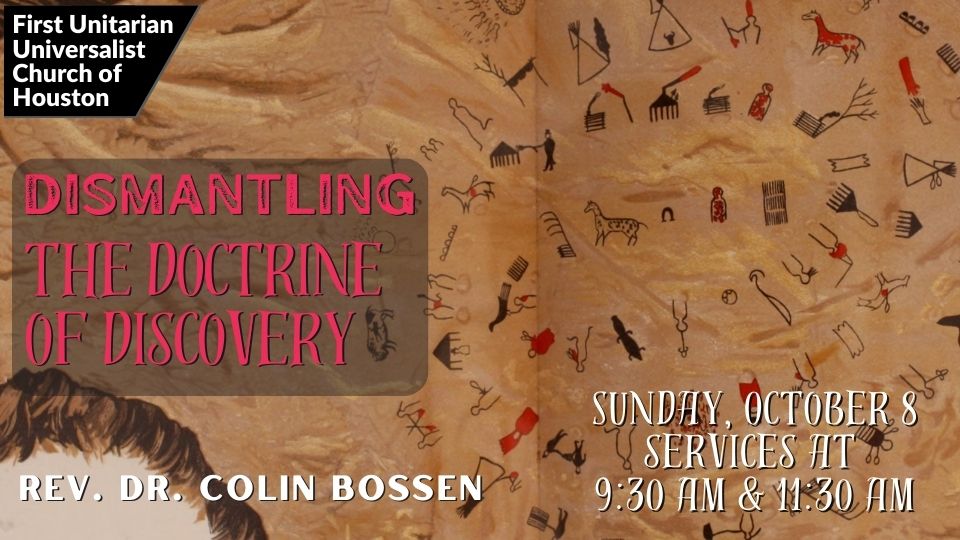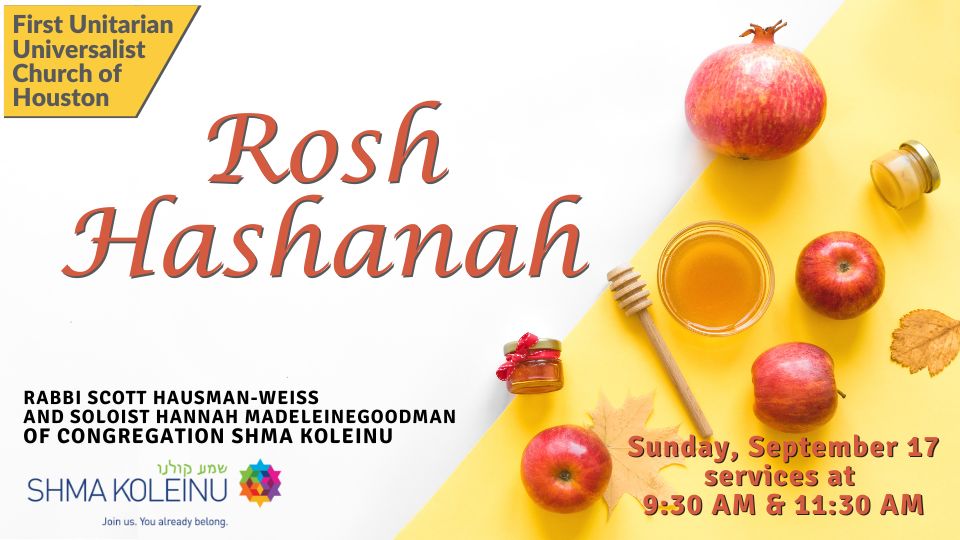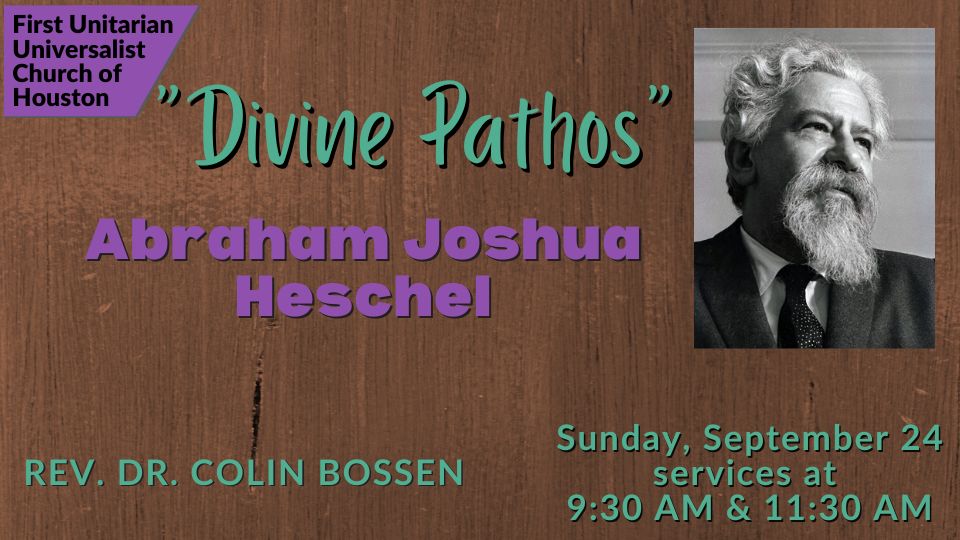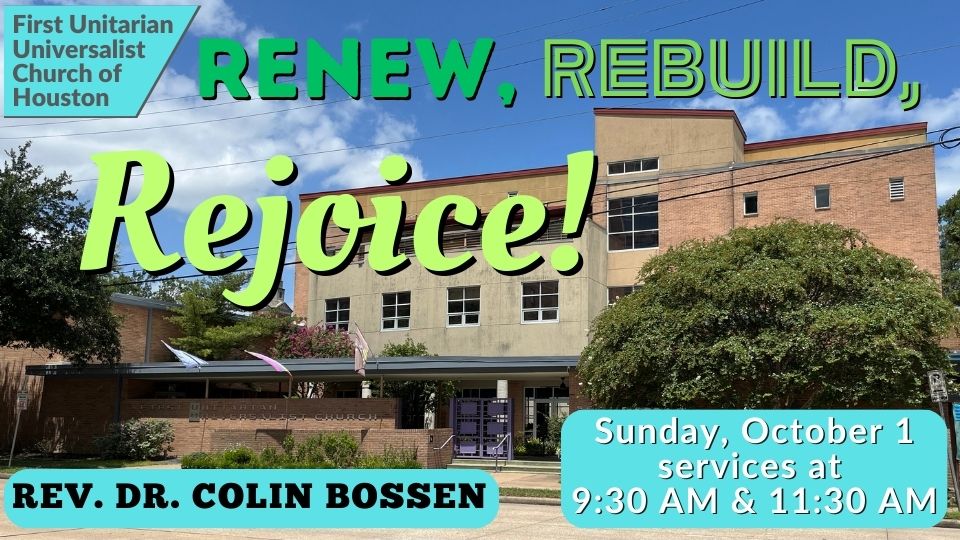News – October 6, 2023

Dear Friends and Members,
I was asked a great question at a recent Lives of the Spirit Covenant Group meeting. And it wasn’t about Heschel! It was about something I say nearly every week during the Sunday service:
“We say aloud, or bring to mind, those who we wish to be held by the loving embrace of this religious community. They are part of the great cloud of witness and memory and we will, even if we do not know their names, hold them in our hearts.”
After I pause to hear the names that you, the congregation, speak aloud I say:
“In this great cloud of witness and memory, amid this beloved community, we hear these names and hold them in our hearts.”
I was asked, what in the world does “great cloud of witness and memory” even mean? I had to admit I hadn’t given it a lot of thought, it was part of the liturgy here when I arrived. I said I thought the cloud was a metaphor for the sense of loving community that is created when we come together. But what about witness and memory?
I decided to do a little digging. Rev. Colin said it was part of the liturgy when he arrived here, too! So, I began googling.
The phrase is drawn from the New Testament book Epistle to the Hebrews. The first verse of the twelfth chapter reads, “Therefore, since we are surrounded by so great a cloud of witnesses, let us also lay aside every weight and the sin that clings so closely, and let us run with perseverance the race that is set before us.” (NRSV).
Christian scholars explain that the “great cloud of witnesses” refers to believers who have gone on before. According to them, although in heaven, they continue to participate in the work of the church on earth. In fact, another translation (The Message) reads, “Do you see what this means—all these pioneers who blazed the way, all these veterans cheering us on? It means we’d better get on with it.”
Hebrews was originally written in Koine Greek. In an interesting twist, Greek “nephos,” translated clouds, not only refers to fluffy white clouds in the sky, but also the highest seats in the bleachers in the stadium. Ushers in ancient Greece might have told you that “your seat is in the clouds,” whereas ushers today might say “you’re in the nosebleed section!”
Okay, so that “great cloud of witnesses” refers to engaged onlookers from somewhere up above! But what about memory? Why is the word witness singular?
I can’t claim to know what the person who altered it was thinking, but this is my take on it. Witness, singular, and without an article like a or the, becomes a verb: “to know by personal presence and perception.”
So, a metaphorical cloud created, not by particles of water in the air, but by our collective personal presence and perception. A collective presence that includes those we have just brought to mind, and whose names we have said aloud. A cloud created by our memories of these we love and mention.
So when I say, “In this great cloud of witness and memory, amid this beloved community, . . .” I’m recognizing not only the beloved community gathered in the sanctuary (and online!) I’m including those pioneers of our faith community who blazed the way; I’m identifying not only our memories of those pioneers, I’m referencing the memories of those whose names we lifted up in community. Even if those beloveds are still with us, we cherish the memories of the times when they weren’t struggling. If they have passed on, we cherish the memories of the love we shared with them.
I am so glad I was asked the question: “what does “great cloud of witness and memory” mean?” Now when I say it, it will have a great deal more meaning for me, and I hope for you, too.
Rev. D. Scott Cooper
Associate Minister
First Unitarian Universalist Church of Houston
scott@firstuu.org
I was asked a great question at a recent Lives of the Spirit Covenant Group meeting. And it wasn’t about Heschel! It was about something I say nearly every week during the Sunday service:
“We say aloud, or bring to mind, those who we wish to be held by the loving embrace of this religious community. They are part of the great cloud of witness and memory and we will, even if we do not know their names, hold them in our hearts.”
After I pause to hear the names that you, the congregation, speak aloud I say:
“In this great cloud of witness and memory, amid this beloved community, we hear these names and hold them in our hearts.”
I was asked, what in the world does “great cloud of witness and memory” even mean? I had to admit I hadn’t given it a lot of thought, it was part of the liturgy here when I arrived. I said I thought the cloud was a metaphor for the sense of loving community that is created when we come together. But what about witness and memory?
I decided to do a little digging. Rev. Colin said it was part of the liturgy when he arrived here, too! So, I began googling.
The phrase is drawn from the New Testament book Epistle to the Hebrews. The first verse of the twelfth chapter reads, “Therefore, since we are surrounded by so great a cloud of witnesses, let us also lay aside every weight and the sin that clings so closely, and let us run with perseverance the race that is set before us.” (NRSV).
Christian scholars explain that the “great cloud of witnesses” refers to believers who have gone on before. According to them, although in heaven, they continue to participate in the work of the church on earth. In fact, another translation (The Message) reads, “Do you see what this means—all these pioneers who blazed the way, all these veterans cheering us on? It means we’d better get on with it.”
Hebrews was originally written in Koine Greek. In an interesting twist, Greek “nephos,” translated clouds, not only refers to fluffy white clouds in the sky, but also the highest seats in the bleachers in the stadium. Ushers in ancient Greece might have told you that “your seat is in the clouds,” whereas ushers today might say “you’re in the nosebleed section!”
Okay, so that “great cloud of witnesses” refers to engaged onlookers from somewhere up above! But what about memory? Why is the word witness singular?
I can’t claim to know what the person who altered it was thinking, but this is my take on it. Witness, singular, and without an article like a or the, becomes a verb: “to know by personal presence and perception.”
So, a metaphorical cloud created, not by particles of water in the air, but by our collective personal presence and perception. A collective presence that includes those we have just brought to mind, and whose names we have said aloud. A cloud created by our memories of these we love and mention.
So when I say, “In this great cloud of witness and memory, amid this beloved community, . . .” I’m recognizing not only the beloved community gathered in the sanctuary (and online!) I’m including those pioneers of our faith community who blazed the way; I’m identifying not only our memories of those pioneers, I’m referencing the memories of those whose names we lifted up in community. Even if those beloveds are still with us, we cherish the memories of the times when they weren’t struggling. If they have passed on, we cherish the memories of the love we shared with them.
I am so glad I was asked the question: “what does “great cloud of witness and memory” mean?” Now when I say it, it will have a great deal more meaning for me, and I hope for you, too.
Rev. D. Scott Cooper
Associate Minister
First Unitarian Universalist Church of Houston
scott@firstuu.org



